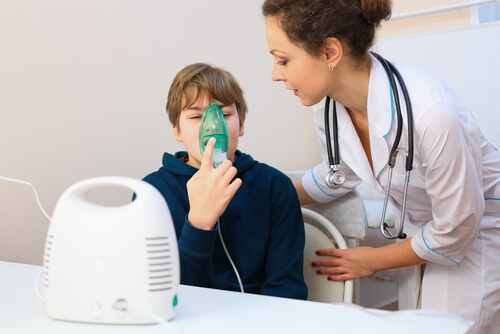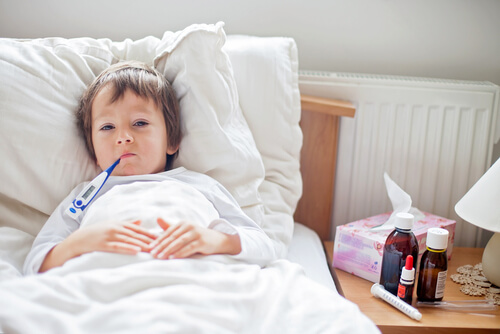Bronchitis in Children, How Can We Help?

Bronchitis in children occurs when there is a significant inflammation of the bronchial mucosa.
One of the most obvious symptoms of bronchitis is cough that is present throughout the day accompanied by respiratory distress. Sometimes the child may also present fever and general malaise.
As a result of coughing, the child may gag or vomit. Vomiting therefore can be another sign of this disease.
Mothers sometimes wonder, what can they do to improve their child’s health when they have bronchitis. In this article we’ll share with you the steps you should take in order to alleviate their bronchitis.
Do you suspect bronchitis? Visit your pediatrician
If you believe that your child is suffering from bronchitis, the first thing that you should do is go to the doctor in order to determine its cause. The doctor will provide a diagnosis and the guidelines that should be followed.
Bronchitis may be due to many factors including viruses, bacteria, allergies and congenital defects. Depending on the cause the doctor will determine whether to administer antibiotics or not.
It’s important for parents to never administer cough syrup without their pediatrician’s prescription. These medications should be avoided since cough often helps expel mucus that could accumulate in the lungs making it even harder for the child to breathe.
If you notice that your child isn’t expelling mucus and that they have a dry cough, you can create a natural inhaler by putting water to boil and then letting your child breathe in the vapor it produces (at a safe temperature).
This will help soften mucus, making it easier for it to be expelled. This technique can be repeated up to 4 times a day.
If your doctor confirms that your child’s bronchitis is caused by allergies, don’t carry out the technique described above. In the case of allergies, this technique will produce the opposite effect to those desired since mites reproduce a lot faster in humid environments.

The importance of rest
Resting well guarantees health. If your child has bronchitis, they should rest as much as possible.
Let the child sleep as much as necessary, it is important for their recovery. While sleeping their head can be positioned a little higher than normal in order to relieve their breathing.
If the child is already of school age, bed rest is also recommended. As the child begins to feel better they shouldn’t be forced to perform rigorous physical activities. They should be allowed to sit out during physical education classes.
Improving symptoms
Keep the child hydrated
Water can help the child in many different ways:
- If the child vomits due to coughing, water will help prevent dehydration.
- On the contrary, if the child coughs but cannot expel mucus, water can help soften mucus making it easier to be expelled.
- If the child loses their appetite, they should be offered water throughout the day because they may also lose their sense of thirst.
Lower their fever
If the child has a high fever, it’s important to try to reduce their body temperature using techniques such as warm water baths or removing their clothes.
Fever can cause general malaise and loss of appetite. The reduction of the child’s fever will make them feel better quickly, they may even regain their appetite.

Help their immune system
If your child doesn’t lose their appetite, you should offer them a healthy and balance diet in order to strengthen their immune system. Make sure to include important vitamins and minerals.
You can also go to your local herbalist to buy herbs that can help your child strengthen their immune system. Some useful products include: Kinesia diluted in water or drops of Propolis diluted in water.
Despite the fact that these are natural products, remember to ask for the recommended dose for children depending on their age and weight.
Don’t be afraid
If the child begins to improve, don’t lock them up at home for fear that they may relapse. The body is wise and if the child is feeling better and wants to play, you should let them have fun. In any case, being outdoors helps reinforce the body’s defenses.
No smoking!
It’s important (and obvious) to keep children away from cigarette smoke since it could worsen their symptoms and cause complications in the short and long term. Keep in mind that when we’re sick we’re more vulnerable to substances in our environment.
The best thing we can do for our children when they have bronchitis or any other illness is to seek immediate professional attention. As the experts say “Timely treatment prevents greater complications.”
Seek your pediatrician’s advice, follow their treatment guidelines and help your child with the tips provided above. You’ll see that your child will recover in a short period of time.
The most important thing to do is help them regain their health, and prevent complications and relapses.
All cited sources were thoroughly reviewed by our team to ensure their quality, reliability, currency, and validity. The bibliography of this article was considered reliable and of academic or scientific accuracy.
- Mainou C; Mainou A; Plaza F. Bronquitis en la infancia: clínica y tratamiento. Farmacia Profesional. Farmacia Pediátrica Vol. 21, Núm. 11, Diciembre 2007.
- García García ML, Korta Murua J, Callejón Callejón A. Bronquiolitis aguda viral. Protoc diagn ter pediatr. 2017; 1: 85-102.
This text is provided for informational purposes only and does not replace consultation with a professional. If in doubt, consult your specialist.








